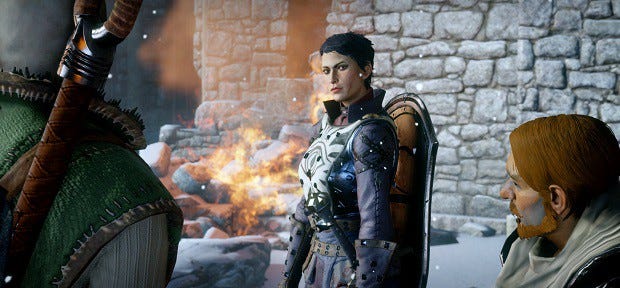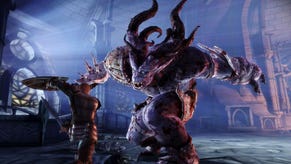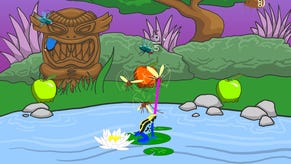Wot I Think: Dragon Age - Inquisition
Unexpected
Dragon Age: Inquisition might just be my favourite game released this year. Considering my expectations and relationship with recent BioWare games, that's about as likely as Saturday night's soggy kebab being my favourite meal of the year. I've spent almost sixty hours uncovering as much of Inquisition's enormous open world and intricate story as possible, and as soon as I have a few days free, I'll be spending another sixty or eighty hours seeing it all through new eyes.
Before digging into the details, here's an overview of what Inquisition does. What is the base of the game that I'm so enthusiastic about. It's a sprawling, well-crafted story, with an intelligent approach to its world-building and the inclusion of player choice in the deconstruction and reconstruction of that world. A comparison to Shadow of Mordor is relevant - a game with which Inquisition shares mostly surface detail, and one striking approach to its treatment of questing and discovery. Both games have maps that sometimes look to be cluttered with the UBIquitous icons that overcrowd some of their contemporaries, but both ensure that the player doesn't feel like a janitor, cleaning up collectibles.
Mordor engages by means of a world in motion, with the nemesis system at its heart. Monolith's mechanical overhaul of open world conventions is precisely the sort of innovative leap that I hope to see fine-tuned and translated into new settings. It'll be odd playing Far Cry 4 next week and realising that a specific elephant in the world will never become my sworn enemy, cropping up three hours after our first encounter with an attitude problem and a proposterous name. Babar the Bruiser, with a voice like a week-old Irish whiskey. I want the families of GTA NPCs who I mow down during a chaotic chase to seek vengeance and hunt me down where I live, or make entire city blocks a no-go area for my careless carjacker.
DA:I's approach will be much harder to replicate. It's a game thick with merits and while there is no single innovative idea that stands out like Mordor's implementation of the nemesis system, instead almost every feature and piece of content is delivered at the highest level of quality. It's as much an embarassment of riches as the invaluable collection of Count Duckula erotica that you stand to inherit from that one elusive uncle.
That's not to say Inquisition is anything more than an excellent piece of genre fiction. It's a fantasy RPG, with clever embellishments, and the good work that its developers have done is very much contained within recognisable parameters. BioWare have pushed the boat out but it remains within chartered waters, navigating them with an enviable apparent ease that can only be achieved by a crew working with intensity and precision behind the scenes. It's that intensity and precision that will be difficult to replicate rather than the particular course taken.
Inquisition's regions are open for exploration and are (mostly) enormous and thick with quests, monuments, collectibles, characters, campsites, eye-catching details, roaming enemies, snippets of history, shards, crafting materials and wildlife. There's a preposterous amount of things to do, many of them seeming to be little more than distractions from the storyline, but the majority are interesting. It's almost as simple as that - make the content interesting and the proliferation of icons isn't distracting or overwhelming - it's promising.
Not quite that simple though. The game's strongest moments are tied to the main quest line, which is the usual story of a world in crisis, but with the added intrigue of an agency undergoing a difficult reincarnation. The Inquisition of the title is a new entity based on an organisation with a dubious historical legacy and as well as spending your time gallivanting around the wild arts of the world, you'll be convening with your war council at the snowy outpost of Haven to plan your actions on the grander stage.
The war council is made up of characters with their own personalities and stories. They're not quite like the allies who hurl spells and wave axes in your adventuring party, but you'll grow to like/love/loathe them as much as any close companion. Initially, their purpose seemed slightly obscure - they can undertake missions by directing them toward points of interest on a world map, but these take place unseen, with a textual result delivered the next time you check in at the council.
A certain amount of time (real time) must pass before a mission concludes, which led me to believe they might be optional means to accrue bonus gold and equipment rather than a core part of the game. That's sort of true, although as the story progresses, decisions to deal with characters and events through diplomacy, espionage or military means have consequences beyond binary success or failure.
The War Council isn't a particularly complex addition but it ties in to Inquisition's broader themes so neatly that it takes on a significance beyond its nuts and bolts implementation. While you do get to play the hero in DA:I, you're responsible for the reputation and operations of the Inquisition rather than a simple party of adventurers - there are political, social and religious rifts to ponder, as well as the slightly more pressing matter of physical rifts that open up onto the demon-infested Fade.
Let's talk about the heroics first. Your character is chosen from four races and three classes, and after a brief slog through the preliminary necessaries (tutorial, prologue, swift exposition dump) you find that you may be The Last Hope for the peoples of the world. A breach has opened in the sky and threatens to devour the entire world. With a mysterious mark on your hand and a groan-inducing spot of amnesia, you find that only you have the power to slow the growth of the breach, and to close the many rifts that have opened around the world, like scars in the fabric of reality.
Simple, right? You're a sort of olde world ghostbuster, zapping demons and closing portals to the nether regions. Well, quite, but things are complicated by the rebellion of the mages and the dogmatic brutality of the Templars. There's a war brewing and the fallout is terrible - refugees, slaughter, starvation. It's a miserable world that you wake up in after your encounter at the Breach and, worst of all, the Breach itself was a major catalyst for all of the animosity.
It opened, you see, during a meeting between mages and Templars, a peace summit led by the Chantry, the world's most powerful religious organisation. The Breach blew it up - the peace summit that is. And most of the Chantry, including its leader. As the sole survivor and someone with a peculiar ability to influence the rifts and Breach alike, you're considered a villain by some and a sort of Messiah by others. You are the Herald, a legendary figure that most people seem reluctant to believe in, particularly if you happen to be (as I was) in the form of a dwarf, a creature born and raised outside the society and belief systems that the Herald is integral to.
By making the player character a figure tied to religion, history and politics - through his/her nomination as the Herald and the Inquisition - BioWare rephrase the usual hero's story. In the politest possible terms, fuck your character arc. Or, at least, relegate it to the background. Nobody gives a crap if you want to be gritty and renegade-y, or if you're the most virtuous, dimple-chinned bloke in existence. You are trying to save the world from going to hell and the decisions you make, the big ones at least, will be difficult because everyone seems to be in conflict with everyone else.
Most people seem to lack respect for what you're trying to do and then there are those who do respect you but have inflated expectations. You're the Herald after all, right, so why aren't you getting things done? The brilliance of your personal story is that it happens as a backdrop to the events you're caught up in. There are friendships to forge and romantic relationships to kindle, but they flow more naturally from the higher level decisions and observations you make.
Yes, there's the occasional awkward dialogue choice popping up seemingly from nowhere - "Let's get to know one another better. Are you seeing anyone?" - but even the occasionally daft sexy chatter usually serves as more than fanservice. For all of its conflict, the world of Dragon Age has a far broader range of social norms than many places on Earth and there's a gracefulness in the handling of that which I haven't noticed in previous BioWare games. Inquisition explicitly states characters' preferences and prejudices in a way that can feel empowering or crushing, and there are far bolder and subtler approaches to sexuality, discrimination and religious faith than I expected.
As I write that, I can't help thinking that, yes, at one level it is a game about dwarves and elves bumping uglies. Sure. But it's a bloody good one and finds wit, charm, excitement and smarts in the conflicts of its setting.
I haven't explored every romance in the game because I'm in a committed and stable relationship, and would probably need an extra 100 hours to play with, but there's barely a dialogue option, quest or scene that doesn't add to the understanding of an individual or culture. Everything happens for a reason, even the 'collect 15 pieces of meat' quests.
There are fetch quests of that sort but the beauty of the game's structure is that they are what happens while you're doing more important things. You can't walk for a minute in any direction without finding something to do, which means if you don't like whatever's currently on your plate, you can head to the next buffet table just over the crest of a hill. And that thing you didn't feel like doing? Maybe you'll end up completing the task in passing, while concentrating on other things.
The basic flow of the game is to build up the Inquisition's power by completing important quests - gathering allies, solving regional problems and the like - so that new areas can be explored on the world map. Once you step into a fresh region with your party, the process of gathering power begins again and completing a couple of big story missions should be enough to unlock the next area.
In reality, the flow is disrupted by the many distractions on each map. If I head north to recruit the horsemaster I'm likely to end up exploring the area around his farms to flush out some rebel outposts and then, oh, let's track down the source of the wolf problem, which happens to be next to a rift that I could seal while I'm hereabouts and, hey, is that a mysterious ruin, I wonder what's inside...
You could probably spend thirty hours on the first major region alone and it wouldn't be time wasted. Even when details are incidental, they're well-crafted. The Codex is a delight, containing oodles of lore in all manner of forms. There are poems, songs, pornographic pamphlets, letters, speeches, manifestoes and chapters from books of Demonology. Not all of it is particularly exciting but like almost every part of the game, down to the finest detail, the texts feel like a legitimate figment of the world, contributing to a cohesive and fascinating whole.
The writing is supremely confident with only the smallest spattering of fantasy bullshit. Mostly, it's relatable social and political topics, religion and rebellion, faith and failure. With a chosen one who doesn't necessarily know if or why he/she IS the chosen one, and becomes as much a point of division as of togetherness, there's a tantalising sense of the unknown. While all the elements of the story might be familiar, the whole thing, from start to finish, has its surprises and stings in the tale.
It's often complicated, deliciously so, and there's enough freedom in how to handle it that the world feels more open than even its vast geography might suggest. There are flaws, of course, and I reckon some people will have a much more critical view of the combat. On easy mode, most of Inquisition can be approached as a hybrid RPG-action game, with only minimal prods needed to direct party members while you hammer away at special skills and basic strikes in the thick of the action.
On normal difficulty or higher, the tactical mode is necessary for fights against dragons and demons alike, and even bands of rebels can be a pain in the backside (they love to flank and strike at unprotected rears). With a camera that refuses to zoom out much higher than a dwarf on a stepladder, it's not the most useful tactical mode in existence. Sure, it pauses combat, allows you to set orders (though not to queue a string of commands) and inch time forward with the push of a button, but it's functional at best.
The lack of a full overhead view, showing every combatant at the same time, is baffling and flicking between targets is frustrating and occasionally confusing. It's a shame because in terms of class abilities and resource management, there's a neat squad-based skirmish game here, but it's somewhat obscured. Despite that, I smiled from ear to ear every now and again when I paused the fray and felt as if I were looking at models in the world's most lavish tabletop RPG.
Even though it doesn't fully explore the full extent of its own somewhat limited tactical options, Inquisition never quite allows its combat to become an afterthought, although if your main interest is in the narrative adventure rather than the hacking, slashing and spell-flinging, the easy mode is your friend.
It's impossible to cover everything. Crafting will absorb hours of some players' lives, with different types of several materials available to mix together, creating new weapons, armour and potions. I never deliberately went on harvesting trips but still ended up with enough loot to make a few swords and sets of armour, although they were often slightly creaky and crap because I wasn't paying enough attention to all of the numbers. I was too busy trying to snog an elf.
I haven't enjoyed a BioWare game this much since Baldur's Gate II and I haven't enjoyed an RPG this much since...well, Divinity: Original Sin. Ask me to choose between them though and I'd throw sand in your eyes and run a for the hills clutching them both to my chest.
Is this really a Dragon Age game? I didn't manage to finish the first, despite liking it well enough for a good few hours, and I've only spent a couple of hours with the second. Nothing had prepared me to expect a game so richly realised and solidly built, but here it is. One of the worst things about it is that hair sometimes looks like a hat and almost every moustache and beard resembles a comedy prop. I can live with that and have even learned to find it amusing.
Knowledge of the previous games will let you in on some inside whisperings and jokes, but there is nothing in the lore or the narrative that Inquisition doesn't take the time to explain. And most of the exposition is kept to optional dialogue branches and written entries in the Codex, so you won't be pummelled by it.
It's self-contained, despite drawing on so much history that has already been written - much of which is affected by player choices in the previous games. Those who aren't up to date with the series or have lost data can make all those choices before they begin. And everyone with the slightest interest in dungeons, dragons or dialogue should begin. With Inquisition, BioWare have handled the narrative and consequence of conversation and action with more assurance and depth than Telltale, while also constructing one of the finest and most forward-looking CRPGs ever made.
And I'm as delighted and surprised as anyone.
Dragon Age: Inquisition releases tomorrow in North American, the 20th in Europe, and the 21st in the UK. And later for Japan, for some reason. They have to wait.


















